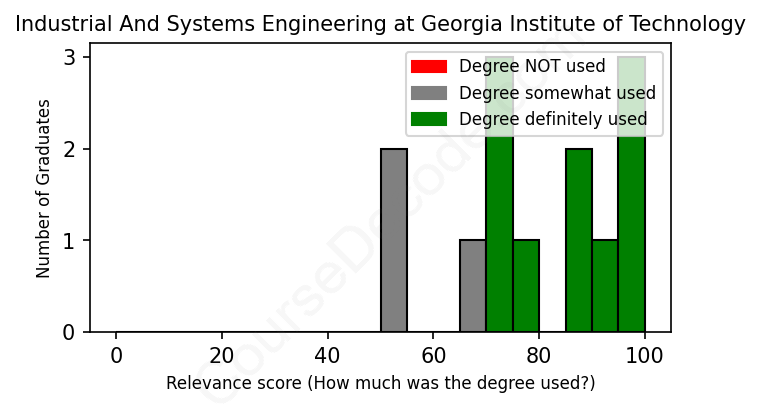
First, some facts. Of the Industrial And Systems Engineering graduates from Georgia Institute of Technology we've analyzed , here's how many have used (or NOT used) their degree in their career:

These are estimates based on AI analysis of 13 LinkedIn profiles (see below).
The verdict? Significantly above average. Overall, with an average relevance score of 78%, Industrial And Systems Engineering graduates from Georgia Institute of Technology have a much higher likelihood (+11%) of finding work in this field compared to the average graduate across all fields:
And for comparison, here's the chart for all profiles we've looked at across all degrees.
Also, after graduating, only 15% of these graduates have pursued further education other than another Bachelor's degree (such as a Masters degree or other), compared to the average across all profiles of 35%. This suggests a Bachelors degree is enough for most Industrial And Systems Engineering graduates, and it's normal to look for work straight after graduation.
See the details:
|
Relevance score: 91% We think this person has gone into a career highly relevant to their degree. We think this person has gone into a career highly relevant to their degree.
DEGREE INFOGraduated in 2013 from Georgia Institute of Technology with a Bachelor of Science in Industrial And Systems Engineering. No other secondary education since. JOB HISTORY SINCE GRADUATIONOperations Supervisor McMaster-Carr Jul 2013 - Oct 2015 Industrial Engineer  ACCENT DECOR, Inc. Nov 2015 - May 2017 Senior Consultant  Stratfield Consulting Jun 2017 - Oct 2019 Production Design Consultant  Chick-fil-A Corporate Support Center Jun 2017 - Oct 2019 Senior Lead Engineer  Chick-fil-A Corporate Support Center Oct 2019 - Nov 2023 Principal Engineer  Chick-fil-A Corporate Support Center Nov 2023 - Present ABOUTNo information provided. |
The top 10 most common jobs done by the graduates we've analyzed (ranked most common to least) are:
When you look at the list of jobs that recent graduates from Georgia Tech’s Industrial and Systems Engineering (ISE) program have taken up, you start noticing a bit of a trend. Many of these individuals have landed roles in consulting, analysis, management, and engineering that utilize their analytical and systems thinking skills. For example, positions like Quality Assurance Engineer, Logistics Analyst, and various managerial roles at companies like The Home Depot and UPS reflect a strong reliance on the principles taught in ISE. It seems that a significant number of grads are leveraging their education in ways that align closely with optimizing processes and improving operational efficiency, which is a big part of what industrial and systems engineering is all about.
However, not all roles are directly relevant to ISE. Some grads have ventured into positions like Editor of Online Publications or Technical Account Manager, which while they might still benefit from the skillset developed during their studies, do not require the depth of engineering knowledge that an ISE degree typically provides. So, if you look at the overall picture, it’s a mixed bag: a considerable number of recent grads are succeeding in roles that are quite relevant to their studies, but there's also a notable portion that have strayed into fields that don't fully utilize their engineering background. It’s a little reminder that while your degree can open doors, what you choose to walk through varies widely from one person to another!
Here is a visual representation of the most common words in job titles for Industrial And Systems Engineering graduates (this is across all Industrial And Systems Engineering graduates we've analyzed, not just those who went to Georgia Institute of Technology):

Graduates from the Industrial and Systems Engineering program at Georgia Institute of Technology tend to have solid career trajectories, often landing jobs that are relevant to their field shortly after graduation. Many of them kick off their careers in roles such as consultants, analysts, or engineers, typically within companies that focus on logistics, consulting, manufacturing, and technology. The early years post-graduation seem to involve a lot of movement, with many jumping into roles that help build their skills and experience. By around five years out, many are moving up the ranks into managerial or senior consultant positions, which suggests that they’re not just getting their foot in the door, but actually taking advantage of opportunities to grow and lead.
As they progress further into their careers, like around the ten-year mark, a lot of graduates appear to be transitioning into higher-level management and strategic roles, such as product management and program management. This is a strong indicator that they are using their engineering backgrounds to influence business strategy and operations. Overall, it looks like people with a degree in Industrial and Systems Engineering from Georgia Tech are doing well for themselves and are finding good opportunities that align with their training. They seem to leverage their skills effectively, and the variety of industries they’re involved in shows they have versatile career paths ahead of them.
Hey! So, getting a Bachelor’s degree in Industrial and Systems Engineering at Georgia Tech is definitely challenging, but it's not impossible. This program is known for its rigor, so you can expect a lot of tough coursework in math, statistics, and engineering principles. Georgia Tech has a reputation for being pretty demanding overall, so if you’re considering this path, be ready to roll up your sleeves and work hard. But if you're passionate about the subject and willing to put in the effort, you'll find it rewarding too! Just keep in mind that it's a step above average in terms of difficulty, but that challenge can really pay off in terms of what you learn.
Most commonly, in the LinkedIn profiles we've looked at, it takes people 4 years to finish a Bachelor degree in Industrial And Systems Engineering.
Based on the job trajectories of these Industrial and Systems Engineering grads from Georgia Tech, it looks like they've generally landed pretty good positions and have been able to climb the career ladder relatively quickly. Many of them started as consultants or analysts and moved into management roles fairly soon after graduation, which is a solid sign that they're likely making decent money. For example, roles like "Senior Project Manager" and "Director of Product Management" usually come with attractive paychecks, especially at well-known companies like The Home Depot and Cox Automotive. Even the more recent grads seem to be on promising paths, with opportunities at prestigious firms like L.E.K. Consulting and EY-Parthenon, which generally offer competitive salaries. So yeah, it seems like they're doing quite well financially!
Here is a visual representation of the most common words seen in the "about" section of LinkedIn profiles who have a Bachelor degree in Industrial And Systems Engineering (this is across all Industrial And Systems Engineering graduates we've analyzed, not just those who went to Georgia Institute of Technology). This may or may not be useful:

Here are all colleges offering a Bachelor degree in Industrial And Systems Engineering (ordered by the average relevance score of their Industrial And Systems Engineering graduates, best to worst) where we have analyzed at least 10 of their graduates:
| College | Score | Count |
|---|---|---|
 The Ohio State University The Ohio State University
|
88 | 17 |
 Virginia Tech Virginia Tech
|
85 | 12 |
 Georgia Institute of Technology Georgia Institute of Technology
|
78 | 13 |
 University of Florida University of Florida
|
75 | 13 |
 Virginia Polytechnic Institute and State University Virginia Polytechnic Institute and State University
|
71 | 12 |